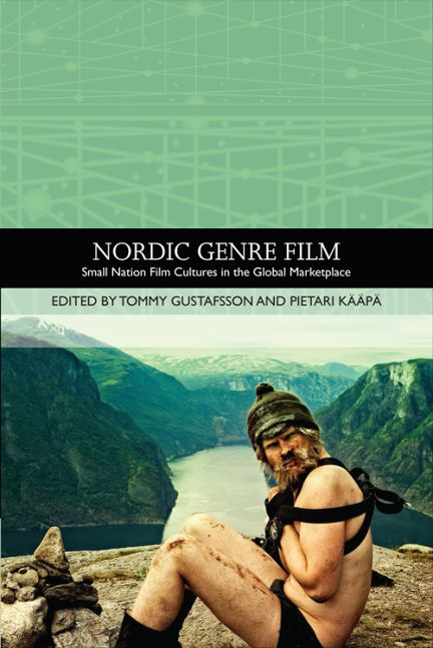Book contents
- Frontmatter
- Contents
- List of Illustrations
- List of Contributors
- Traditions in World Cinema
- Introduction: Nordic Genre Film and Institutional History
- PART I HERITAGE CINEMA AND NATIONAL NARRATIVES
- PART II CRIME AND DETECTIVE NARRATIVES
- 4 Crime Up North: The Case of Norway, Finland and Iceland
- 5 The Thrill of the Nordic Kill: The Manhunt Movie in the Nordic Thriller
- 6 Bridges and Tunnels: Negotiating the National in Transnational Television Drama
- 7 Stockholm Noir: Neoliberalism and Gangsterism in Easy Money
- 8 The Private Life of the Prime Minister? Politics, Drama and Documentary in Pääministeri and Palme
- PART III NORDIC OPTIMISM: ROAD MOVIES, COMEDIES AND MUSICALS
- PART IV NORDIC HORRORS
- PART V GENRE BENDERS
- Index
7 - Stockholm Noir: Neoliberalism and Gangsterism in Easy Money
from PART II - CRIME AND DETECTIVE NARRATIVES
Published online by Cambridge University Press: 25 October 2017
- Frontmatter
- Contents
- List of Illustrations
- List of Contributors
- Traditions in World Cinema
- Introduction: Nordic Genre Film and Institutional History
- PART I HERITAGE CINEMA AND NATIONAL NARRATIVES
- PART II CRIME AND DETECTIVE NARRATIVES
- 4 Crime Up North: The Case of Norway, Finland and Iceland
- 5 The Thrill of the Nordic Kill: The Manhunt Movie in the Nordic Thriller
- 6 Bridges and Tunnels: Negotiating the National in Transnational Television Drama
- 7 Stockholm Noir: Neoliberalism and Gangsterism in Easy Money
- 8 The Private Life of the Prime Minister? Politics, Drama and Documentary in Pääministeri and Palme
- PART III NORDIC OPTIMISM: ROAD MOVIES, COMEDIES AND MUSICALS
- PART IV NORDIC HORRORS
- PART V GENRE BENDERS
- Index
Summary
Every man is enemy to every man.
Thomas Hobbes Leviathan (1651/2004, p. 77)Adios losers.
Jorge in Jens Lapidus's Easy Money (Snabba cash, 2006/2008, p. 467)Young punks go from rags to riches, enjoy a brief time in the sun before their downfall in a hail storm of bullets. So goes the classical dark tale of gangsters such as Rico in Little Caesar (novel 1929, film 1931). The American motion picture code's specification that there should be no sympathy for the criminals suggested that there was a dangerous aspect in the attraction to these films (Black 1994: 108). It could very well be that the Motion Picture Producers and Distributors of America (MPPDA) president Will H. Hayes was averse from seeing the harsh social realities of the 1930s Depression depicted on the screen, including a corrupt legal system, but a danger of the gangster film was also its disturbing allegory on the daring entrepreneur that capitalism held up as a social ideal.
In essence, the gangster story is a warped Horatio Alger tale. Carl Freedman notes in his book Versions of Hollywood Crime Cinema (2013: 15–45) that it connects to the mystery of the origins of capitalism in what Karl Marx called ‘primitive accumulation’, the consciously repressed history about how common lands and natural resources were privatised and how companies, backed up by national armed forces, plundered non-European continents of their riches. The greedy and ruthless gangster's rise to social success is but a small-scale reflection of the genocides and the violent redistribution of wealth that gave birth to modern-day capitalism.
Gangsterism is also the ultimate expression of what the German sociologist Ferdinand Tonnies called Gesellschaft. While his other key concept Gemeinschaft describes the ‘natural’ personal relations and values often found in rural communities, Gesellschaft stands for the ‘constructed’ impersonal relations through business and formal interaction that characterise life in the urban capitalist era (Asplund 1991: 63–90). As national identity became a central issue in twentieth-century Europe – Fascism being the most extreme ideological project – gangsters and other social, legal and moral transgressors were often defined in popular culture as an alien intrusion of an otherwise idyllic Gemeinschaft.
- Type
- Chapter
- Information
- Nordic Genre FilmSmall Nation Film Cultures in the Global Marketplace, pp. 104 - 118Publisher: Edinburgh University PressPrint publication year: 2015



